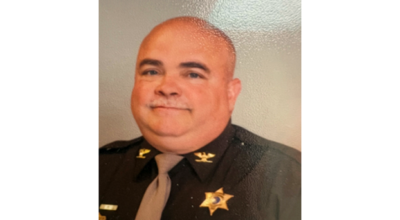‘All Rise’ lauds Cass courts as models
Published 6:58 pm Tuesday, May 21, 2013

Motorcycles, including SMC President Dr. David Mathews, heralded the arrival of the National Association of Drug Court Professionals in Cassopolis Tuesday.
CASSOPOLIS — Part pep rally, part sobering reflection on Cass County’s 11-year journey with drug courts, the All Rise America! motor home rolled up to the Law and Courts Building Tuesday led by motorcycles, with Southwestern Michigan College President Dr. David Mathews astride the lead bike.
It was an odd scene inside, too, with a makeshift court filling the corridor and a gavel banging as the loud crowd whooped it up at the 17th stop in a trip which began April 28 in California and ends May 31 in New York.
“We fight every day to put drug court within reach of every single person who needs it,” Chris Deutsch of NADCP, the National Association of Drug Court Professionals, said. “May is National Drug Court Month. We’re highlighting communities that are getting it right. Model communities for what can be accomplished when we say no more are we going to discard addicted people. Communities committed to evidence-based treatment are truly changing the face of criminal justice in this country. That’s why we’re in Cassopolis.
“We’ve made incredible progress in 25 years drug courts have been around,” Deutsch said. “Over a million people have completed drug court. We pass around this All Rise gavel at every stop. It’s our version of the Olympic torch. When one person rises out of addiction and finds recovery,” such as Essence Romans, Tia Anderson and Misty Dotson, “we all rise. Sometimes we hear those words at the beginning of court and it means bad things might be about to happen, but it means something totally different in drug court because there is a network of support. When mothers are reunited with their children, we all rise. When veterans get treatment and benefits they’ve earned, we all rise.”
“It’s good to see us finally keeping people out of jail and stopping recidivism,” Chris Rockafellow, a 16-year court veteran and former police officer who started at 24, said.
Judge Susan Dobrich said a few have been along for the journey since 2002, including Dr. Barbara Howes, known for saying, “The one thing you’ve got to change is everything,” and attorney Greg Feldman.
“With Sobriety Court in adult court and Swift and Sure we’ve completed the continuum” through all three courts presided over by herself, Circuit Judge Michael Dodge and District Judge Stacey Rentfrow, forging partnerships with Hope’s Door in Dowagiac, Michigan Department of Corrections, SMC and Woodlands Behavioral Healthcare Network.
“The entire country has 23 stops, and we’re one of them,” Dodge said, welcoming Berrien County Judge Sterling Schrock, Woodlands Executive Director Kathy Emans, County Administrator Louis Csokasy, Dowagiac City Manager Kevin Anderson, Public Safety Director Tom Atkinson, Lewis Cass Intermediate School District Supt. Robert Colby, Prosecutor Victor Fitz, County Clerk-Register Monica Kennedy, Department of Human Services Director Cindy Underwood, County Commissioner Robert Wagel, Carl Butler of the Department of Corrections, Juvenile Court Referee Leigh Feldman and Dee Duszynski, reception organizer.
“Family Treatment Court focused on sobriety,” Dobrich said, “but we discovered the most important part is being independent and having a job. The community college is a critical partner.
“It was strange and wonderful to be on a motorcycle, following the car with the flashing lights, instead of the other way around,” Mathews said. “We try to provide people tools to help themselves lead better lives. Seventy percent of our students are first in their families to go to college.”
Romans’ struggle with methamphetamine was chronicled in the Daily News in December 2011. Like Anderson, she works for Woodlands.
Anderson, 32, who ran away from home at 13, dropped out of school in ninth grade and first tried meth at 19 while working in a trailer factory, shared her story with the League of Women Voters last October at Fernwood near Niles.
“I thought a drug addict was all I was ever going to be,” Anderson said, “but Judge Dobrich and Family Treatment Court saw something different. Nobody ever told me I could be successful. Every week the judge told me things I did right instead of things I did wrong, which was very powerful. They held me accountable for things I did wrong. My GED became reality, not some far-off dream. I was accepted into SMC, which was amazing. Small successes turned into bigger successes, which showed me what Family Treatment Court said about me was right. I could be like regular people. I have my kids back, a house — Essence and I are peer support specialists for Woodlands and we facilitate a women’s group — I’m getting married next month and excited to know I’m going to have another baby. The last time I was pregnant I was a drug addict. Family Treatment Court gave me my life back and showed me how to be a healthy parent.”
“I’m so proud of what this county is doing above and beyond other treatment courts,” Anderson said. “They’re changing lives.”
Dotson shared her story with Dowagiac Rotary Club in February.
“In the last stages of drug addiction, I almost took my life,” said Dotson, of Dowagiac. She reunited with her son and moved from working at Hope’s Door thrift store to McDonald’s.
“I believe I’d be dead now if it wasn’t for this community,” Dotson said, which is why FTC “lit a fire in me. I want to give back.”






